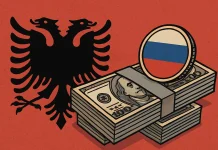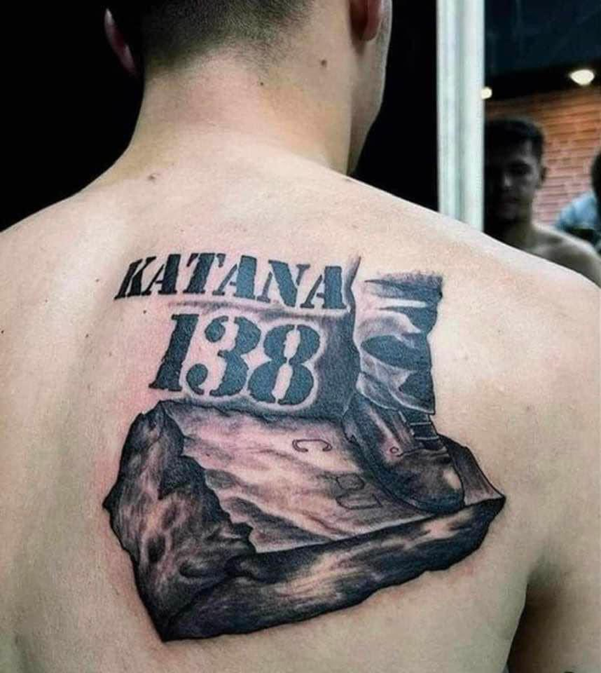Nevila Gjata
On October 15 of this year, Tomi Frashëri, the Chairman of the Electronic and Postal Communications Authority (AKEP), stated during a session of the special parliamentary commission on disinformation and foreign interference that his institution had blocked 155 Russian domains. He noted that the closures were primarily due to positions and publications of data supporting Russian aggression in Ukraine.
‘The request to block Russian domains has been global since March 3, 2022, when the European Commission (EU) directly requested the closure of not only three specified websites but also other Russian domains that were taking positions and publishing data supporting Russian aggression. These domains had to be shut down as they contained disinformation,’ said Tomi Frashëri, Chairman of AKEP.
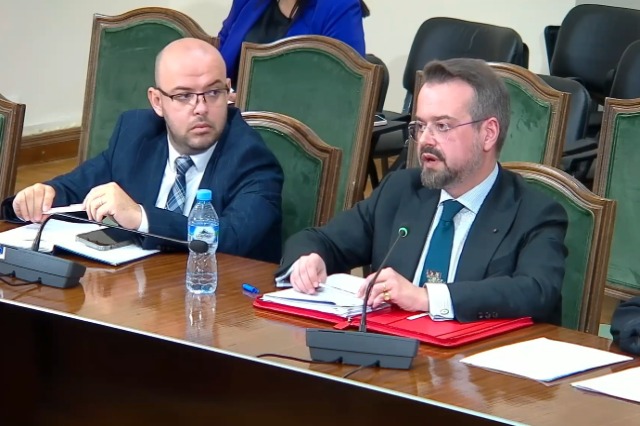
‘The request to block Russian domains has been global since March 3, 2022, directly from the European Commission (EU), which asked for the closure of not only three specified websites, whose names I will not mention, but also other Russian domains that took positions and published data supporting Russian aggression. These domains had to be shut down because they contained disinformation,’ said Frashëri during the special parliamentary commission session.
Since Russia’s aggression in Ukraine, specialized sources monitoring wartime disinformation have documented how the Russian apparatus systematically uses disinformation as a tool, promoting a false narrative regarding the reasons behind the invasion of Ukraine. These narratives involve not only the coordination of efforts by the Russian government and its state-backed media but also the use of various platforms and online methods, including the exploitation of Russian domains (though not all of them). How much of a role do these domains play in Albania’s fight against disinformation? This and other questions arise in this context.
The ‘bombshell’ statement
The Chairman of the Regulatory Authority (AKEP), Tomi Frashëri’s statement about the closure of 155 Russian domains as part of the effort to combat disinformation made a major impact in the country’s mainstream media. More than the explanations provided by Frashëri during the Q&A session (which helped clarify AKEP’s role in this effort), what resonated widely in the media were the headlines, often propagandistic and repeated across major outlets, stating: ‘155 Russian domains were shut down.’ This created the perception (reinforced by the headline) that shutting down these domains was a significant move in the fight against disinformation within the country, without addressing how much influence they had in the broader scope of this ongoing battle.
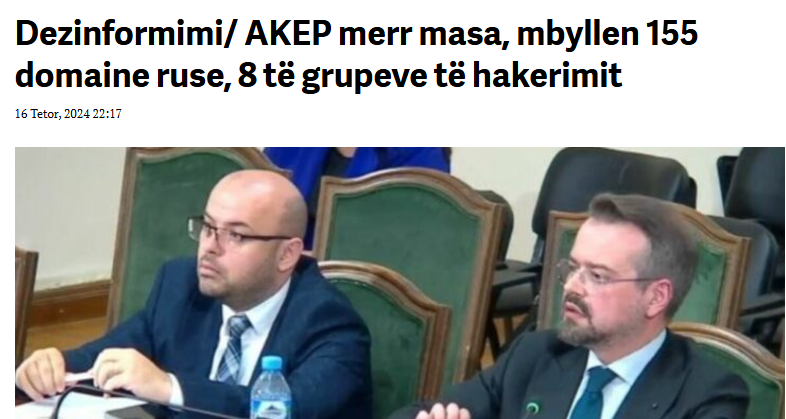
Source:BW
To understand the significance and the narrative created in the media regarding the fight against disinformation within the country through the closure of 155 domains, we first need to comprehend what domains are, how many there are, what kind of access they offer, and the impact they have.
‘A domain is a unique internet address that helps users find websites and online services. It is the main part of an address, such as ‘google.com,’ ‘facebook.com,’ or ‘faktoje.al,’ and makes it easier to access websites without needing complex numerical addresses (IP),’ says Kadri Manaj (IT expert)

‘A domain is a unique internet address that helps users find websites and online services. It is the main part of an address, such as ‘google.com,’ ‘facebook.com,’ or ‘faktoje.al,’ etc and makes it easier to access websites without needing complex numerical addresses (IP),’ explains Kadri Manaj, an Information Technology expert, to Faktoje.al., AKEP further clarifies to Faktoje.al that ‘a domain name is an alphanumeric combination made up of a root and a suffix. It consists of two or more textual segments separated by dots, like icann.org.’
What about the Russian domain? Expert Manaj says, ‘The .ru domain is the national domain for the Russian Federation, primarily used by individuals and organizations within Russia or those targeting the Russian market. According to the IT expert, registering a .ru domain is open to everyone, with no nationality or specific restrictions.
To register, an individual must provide a copy of an identification document (e.g., passport or ID), while organizations need to submit company registration documents and a tax identification number (TIN). ”Some of the requirements for the registration process include:Uploading Identification Documents: Individuals need to provide a copy of an identification document (e.g., passport or ID). Organizations must provide company registration documents and TIN.
Use of a Local Address: In some cases, the registrar may require a contact address in Russia. Many international registrars offer intermediary address services for this purpose.
International registrars: There are international companies that help facilitate the process for foreign individuals and organizations wishing to purchase a .ru domain, assisting with the necessary documents and local requirements,’ explains Manaj. According to him, Russian domains can be purchased from sites like reg.ru. How much does a Russian domain cost? Just 119 ₽ or $1.19.
AKEP and Its Role
Faktoje.al submitted a request for information to AKEP learn specifically from them about Russian domains, their contents, AKEP’s role in this matter, and the procedure followed to shut them down. Right from the beginning of its response, AKEP informs that the identification of illegal or harmful online content, and their corresponding domains, is not within its responsibility. ‘First, we clarify that based on Paragraph 1 of Article 2 of Law No. 9918/2008 ‘On Electronic Communications in the Republic of Albania,’ as amended, AKEP does not have the legal authority to examine the content of electronic communications, including content published on websites, online platforms, etc.,’ AKEP stated in its response.
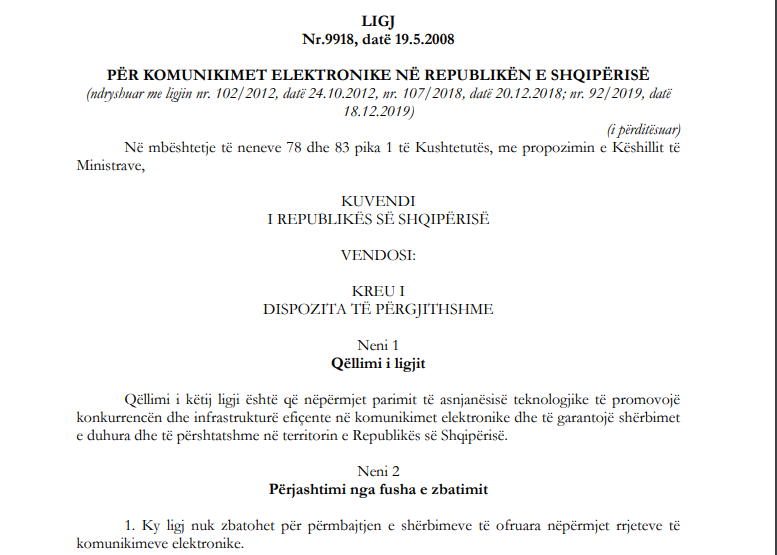
Screenshot of the law that AKEP relies on
As a result, AKEP clarifies that it does not have the legal authority to examine content published on websites, including those using country-specific domains such as ‘.ru’ or other general domains like ‘.com’, ‘.net’, etc.
‘Therefore, AKEP cannot verify and does not have knowledge of how many Russian domains are accessed (content opened) in Albania,’ AKEP points out.
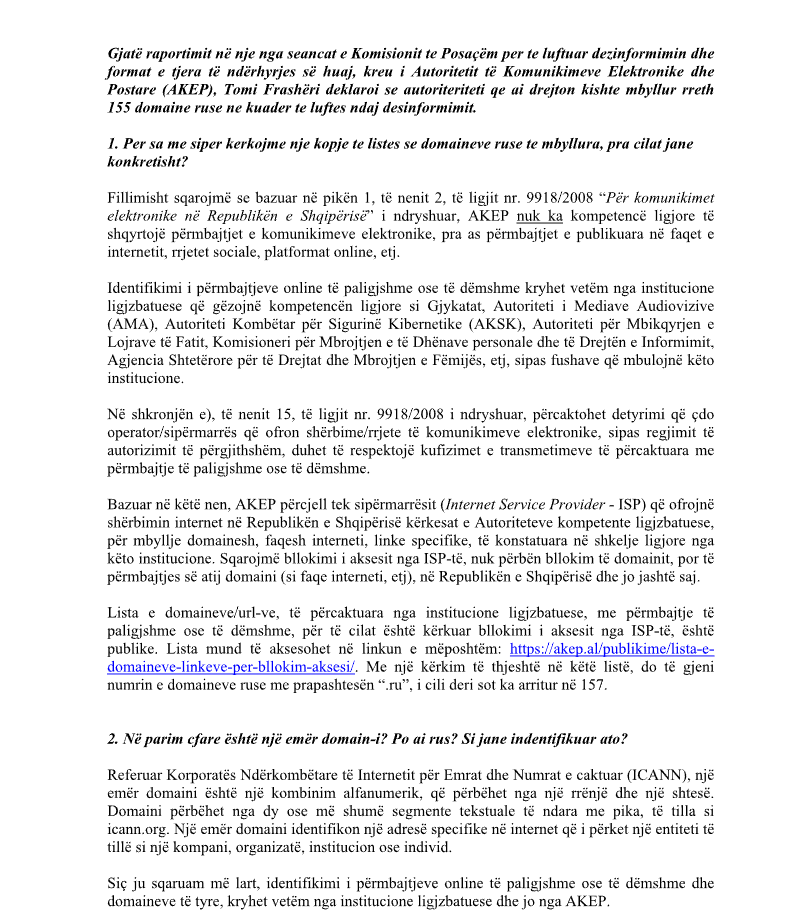
Screenshot of AKEP’s response to Faktoje.al
The regulatory body gives the same response to another question posed by Faktoje, asking whether it is aware of any Albanian websites spreading disinformation.
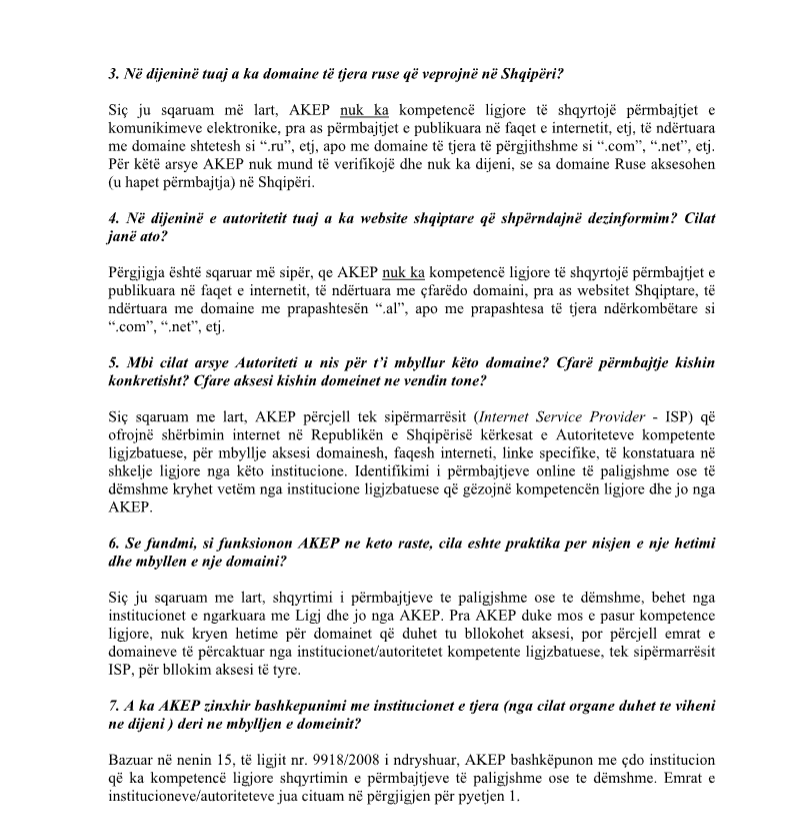
Screenshot of AKEP’s response
‘AKEP does not have the legal authority to review content published on websites, whether they are built with any domain, including Albanian websites with ‘.al’ domains or other international suffixes like ‘.com’, ‘.net’, etc.’
AKEP further explains that the identification of illegal or harmful online content is the responsibility of law enforcement institutions that hold the legal competence. What are they according to AKEP? ‘The identification of illegal or harmful online content is carried out solely by law enforcement institutions that have legal authority, such as the Courts, the Audiovisual Media Authority (AMA), the National Authority for Cybersecurity (AKSC), the Authority for Gambling Supervision, the Commissioner for the Protection of Personal Data and the Right to Information, the State Agency for the Rights and Protection of Children, and others, according to the areas covered by these institutions…’
In contrast to the aforementioned institutions, AKEP (lacking legal authority) emphasizes that it does not conduct investigations into domains that should have their access blocked. Instead, it forwards the requests from competent authorities for the closure of domains, websites, or specific links to the Internet Service Providers (ISPs) that provide internet services in the Republic of Albania. ‘We clarify that blocking access by ISPs does not mean blocking the domain itself, but rather the content of that domain (such as websites, etc.) within the Republic of Albania, and not outside it,‘ AKEP underscores.
List
The list of domains/URLs identified by law enforcement agencies, containing illegal or harmful content, for which access blocking has been requested from ISPs, is easily accessible on AKEP’s official website.
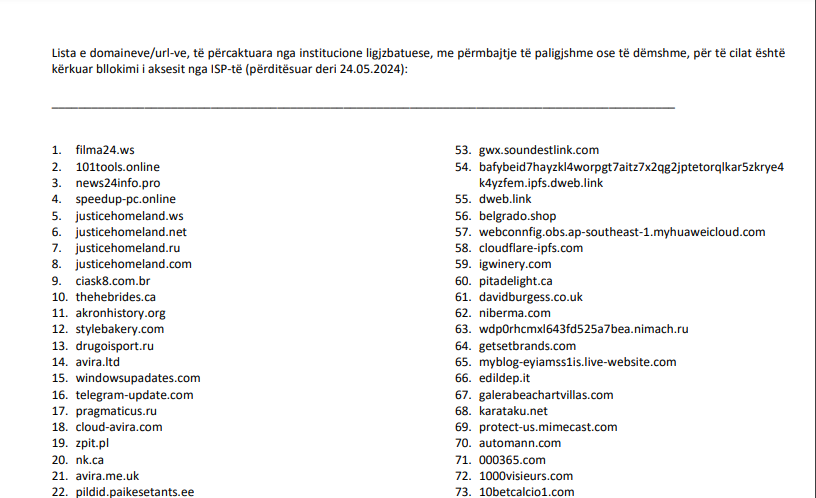
Screenshot of a portion of the list of domains/URLs identified by law enforcement agencies with illegal or harmful content, for which access blocking has been requested by ISPs (updated until 24.05.2024)
In response to Faktoje.al, AKEP informs that, from the list of closed domains (which reached 6459 by the time of publication), 157 of them are ‘.ru’ domains. However, even if the domains are blocked, IT expert Kadri Manaj notes that they can still be reopened by changing the DNS (Domain Name System) or using a VPN (Virtual Private Network)…




